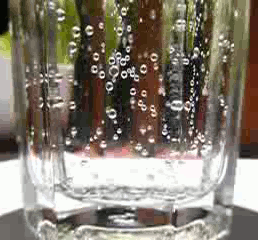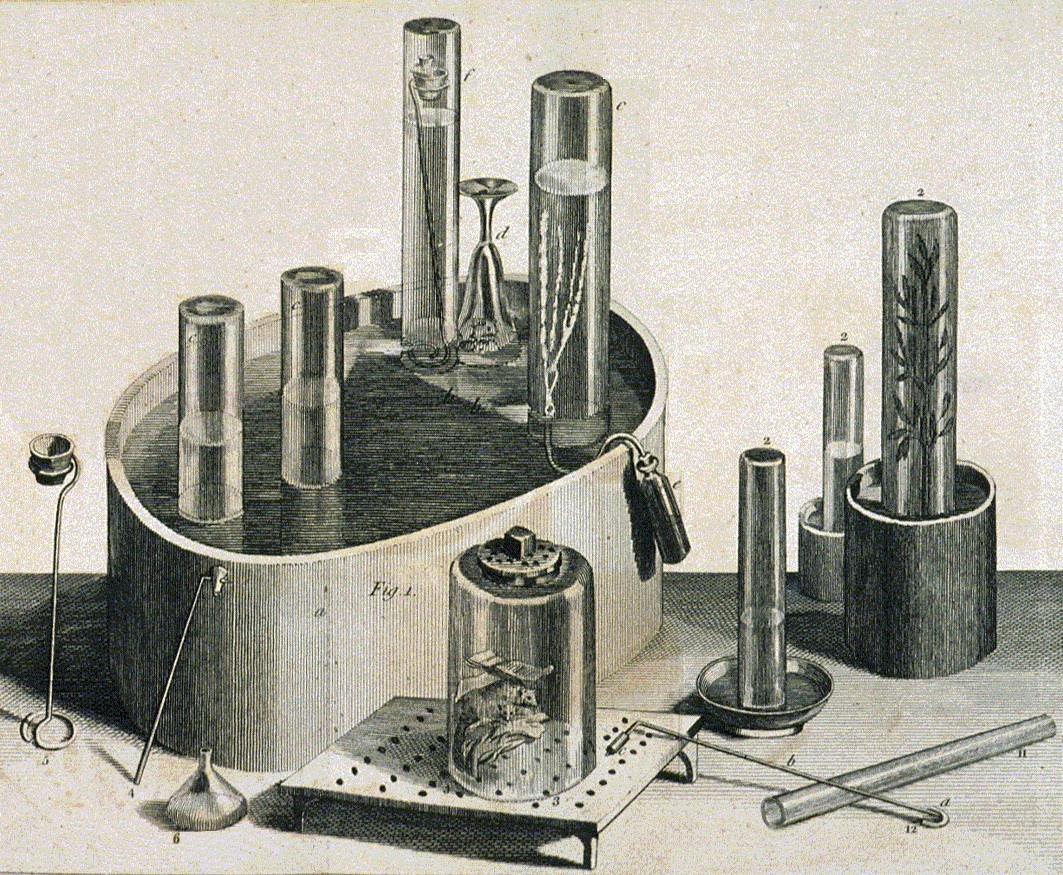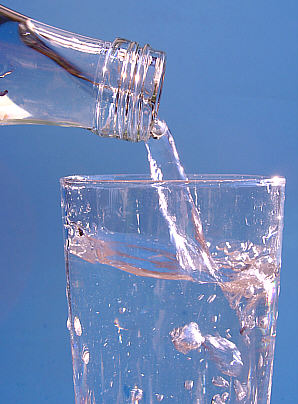|
Selters
Selters is a German brand of natural mineral water sourced from wells in the area of Selters in Hesse, at the Taunus mountains. The water has been known since the Bronze Age and famous as a natural soda water because of its high concentration of sodium bicarbonate, "soda". The Selters water also contains raised levels of calcium, chloride, magnesium, sulfate and potassium ions. The water is naturally carbonated, over 250 mg/L, but sold in both sparkling and still versions. The name and the water of Selters are the prototype of seltzer, a generic term for soda water in the United States. History The Romans used the wells and may have given the origin of the current name Selters, either from la, aqua saltare (water jump) or la, saltrissa (salt rising), but both possibilities present linguistic uncertainties. The same name is also used in some other places in Germany with mineral wells. The wells are mentioned already in 772 in documents at the nearby monasteries in Fulda ... [...More Info...] [...Related Items...] OR: [Wikipedia] [Google] [Baidu] |
Selters (Taunus)
Selters (Taunus) is a municipality with 8,000 inhabitants north of Bad Camberg in Limburg-Weilburg district in Hesse, Germany. Geography Location The greater part of the Selters municipal area with the centres of Niederselters, Eisenbach, Münster and Haintchen lies in the area of the Eastern Hintertaunus north of the Taunus' main ridge, at elevations from 170 to 500 m. In terms of natural environments, the main centre, Niederselters, also belongs to the southeastern part of the Limburg Basin. giving it a connection to the valley landscape of the Lahn. The fracture zone opening here into the basin from the south, the ''Idsteiner Senke'' (hollow), is locally known along the Emsbach, which empties into the Lahn, by the name ''Goldener Grund'' (“Golden Ground”), a reference to the favourable climate and fruitful soil (loess). The northern part of the community around Münster belongs geologically to the Lahn Basin, which is known for its mineral wealth from the Middle D ... [...More Info...] [...Related Items...] OR: [Wikipedia] [Google] [Baidu] |
Selters
Selters is a German brand of natural mineral water sourced from wells in the area of Selters in Hesse, at the Taunus mountains. The water has been known since the Bronze Age and famous as a natural soda water because of its high concentration of sodium bicarbonate, "soda". The Selters water also contains raised levels of calcium, chloride, magnesium, sulfate and potassium ions. The water is naturally carbonated, over 250 mg/L, but sold in both sparkling and still versions. The name and the water of Selters are the prototype of seltzer, a generic term for soda water in the United States. History The Romans used the wells and may have given the origin of the current name Selters, either from la, aqua saltare (water jump) or la, saltrissa (salt rising), but both possibilities present linguistic uncertainties. The same name is also used in some other places in Germany with mineral wells. The wells are mentioned already in 772 in documents at the nearby monasteries in Fulda ... [...More Info...] [...Related Items...] OR: [Wikipedia] [Google] [Baidu] |
Selters (Lahn)
Selters is a village in the district Limburg-Weilburg, Hesse, Germany. It is situated at the Taunus side of the river Lahn and belongs to the municipality Löhnberg. The village has a total population of about 400 inhabitants. The village is famous for its natural springs of carbonated mineral water, which is sold as Selters water. In English, both Seltzer and Alka Seltzer refer to the toponym. Location Löhnberg-Selters lies near Wiesbaden in direction to the Taunus mountains near the river Lahn and between Wetzlar and Limburg in Hesse Hesse (, , ) or Hessia (, ; german: Hessen ), officially the State of Hessen (german: links=no, Land Hessen), is a state in Germany. Its capital city is Wiesbaden, and the largest urban area is Frankfurt. Two other major historic cities are Dar .... History The ancient Romans (who occupied Germany between 50 B.C. and 475 AD) called the places where water emerged from underground ''Aqua Saltare'' for "dancing water." This name was app ... [...More Info...] [...Related Items...] OR: [Wikipedia] [Google] [Baidu] |
Seltzer Water
Carbonated water (also known as soda water, sparkling water, fizzy water, club soda, water with gas, in many places as mineral water, or especially in the United States as seltzer or seltzer water) is water containing dissolved carbon dioxide gas, either artificially injected under pressure or occurring due to natural geological processes. Carbonation causes small bubbles to form, giving the water an effervescent quality. Common forms include sparkling natural mineral water, club soda, and commercially-produced sparkling water. Club soda and sparkling mineral water and some other sparkling waters contain added or dissolved minerals such as potassium bicarbonate, sodium bicarbonate, sodium citrate, or potassium sulfate. These occur naturally in some mineral waters but are also commonly added artificially to manufactured waters to mimic a natural flavor profile and offset the acidity of introducing carbon dioxide gas. Various carbonated waters are sold in bottles and cans, with some ... [...More Info...] [...Related Items...] OR: [Wikipedia] [Google] [Baidu] |
Carbonated Water
Carbonated water (also known as soda water, sparkling water, fizzy water, club soda, water with gas, in many places as mineral water, or especially in the United States as seltzer or seltzer water) is water containing dissolved carbon dioxide gas, either artificially injected under pressure or occurring due to natural geological processes. Carbonation causes small bubbles to form, giving the water an effervescent quality. Common forms include sparkling natural mineral water, club soda, and commercially-produced sparkling water. Club soda and sparkling mineral water and some other sparkling waters contain added or dissolved minerals such as potassium bicarbonate, sodium bicarbonate, sodium citrate, or potassium sulfate. These occur naturally in some mineral waters but are also commonly added artificially to manufactured waters to mimic a natural flavor profile and offset the acidity of introducing carbon dioxide gas. Various carbonated waters are sold in bottles and cans, with ... [...More Info...] [...Related Items...] OR: [Wikipedia] [Google] [Baidu] |
Soda Water
Carbonated water (also known as soda water, sparkling water, fizzy water, club soda, water with gas, in many places as mineral water, or especially in the United States as seltzer or seltzer water) is water containing dissolved carbon dioxide gas, either artificially injected under pressure or occurring due to natural geological processes. Carbonation causes small bubbles to form, giving the water an effervescent quality. Common forms include sparkling natural mineral water, club soda, and commercially-produced sparkling water. Club soda and sparkling mineral water and some other sparkling waters contain added or dissolved minerals such as potassium bicarbonate, sodium bicarbonate, sodium citrate, or potassium sulfate. These occur naturally in some mineral waters but are also commonly added artificially to manufactured waters to mimic a natural flavor profile and offset the acidity of introducing carbon dioxide gas. Various carbonated waters are sold in bottles and cans, with some ... [...More Info...] [...Related Items...] OR: [Wikipedia] [Google] [Baidu] |
Carbonated Water
Carbonated water (also known as soda water, sparkling water, fizzy water, club soda, water with gas, in many places as mineral water, or especially in the United States as seltzer or seltzer water) is water containing dissolved carbon dioxide gas, either artificially injected under pressure or occurring due to natural geological processes. Carbonation causes small bubbles to form, giving the water an effervescent quality. Common forms include sparkling natural mineral water, club soda, and commercially-produced sparkling water. Club soda and sparkling mineral water and some other sparkling waters contain added or dissolved minerals such as potassium bicarbonate, sodium bicarbonate, sodium citrate, or potassium sulfate. These occur naturally in some mineral waters but are also commonly added artificially to manufactured waters to mimic a natural flavor profile and offset the acidity of introducing carbon dioxide gas. Various carbonated waters are sold in bottles and cans, with ... [...More Info...] [...Related Items...] OR: [Wikipedia] [Google] [Baidu] |
Niederselters
Niederselters is an urban district (Ortsteil) of the community Selters in Hessen, Germany. Niederselters station lies on the Main-Lahn Railway. With Oberbrechen station, it is one of two stations in Brechen. Nearby is a Cistercian nunnery Kloster Gnadenthal, Hessen in 3 km. DEU Niederselters COA.svg, Coat of arms of Niederselters DEU Niederselters Banner.svg, Flag of Niederselters Seltersflasche Nassau.JPG, Seltzer water Carbonated water (also known as soda water, sparkling water, fizzy water, club soda, water with gas, in many places as mineral water, or especially in the United States as seltzer or seltzer water) is water containing dissolved carbon dioxide gas, ... flask from the 19th century {{Authority control Villages in Hesse ... [...More Info...] [...Related Items...] OR: [Wikipedia] [Google] [Baidu] |
Hesse
Hesse (, , ) or Hessia (, ; german: Hessen ), officially the State of Hessen (german: links=no, Land Hessen), is a state in Germany. Its capital city is Wiesbaden, and the largest urban area is Frankfurt. Two other major historic cities are Darmstadt and Kassel. With an area of 21,114.73 square kilometers and a population of just over six million, it ranks seventh and fifth, respectively, among the sixteen German states. Frankfurt Rhine-Main, Germany's second-largest metropolitan area (after Rhine-Ruhr), is mainly located in Hesse. As a cultural region, Hesse also includes the area known as Rhenish Hesse (Rheinhessen) in the neighbouring state of Rhineland-Palatinate. Name The German name ''Hessen'', like the names of other German regions (''Schwaben'' "Swabia", ''Franken'' "Franconia", ''Bayern'' "Bavaria", ''Sachsen'' "Saxony"), derives from the dative plural form of the name of the inhabitants or eponymous tribe, the Hessians (''Hessen'', singular ''Hesse''). The geograp ... [...More Info...] [...Related Items...] OR: [Wikipedia] [Google] [Baidu] |
Mineral Water
Mineral water is water from a mineral spring that contains various minerals, such as salts and sulfur compounds. Mineral water may usually be still or sparkling (carbonated/effervescent) according to the presence or absence of added gases. Traditionally, mineral waters were used or consumed at their spring sources, often referred to as "taking the waters" or "taking the cure", at places such as spas, baths, or wells. The term ''spa'' was used for a place where the water was consumed and bathed in; ''bath'' where the water was used primarily for bathing, therapeutics, or recreation; and ''well'' where the water was to be consumed. Today, it is far more common for mineral water to be bottled at the source for distributed consumption. Travelling to the mineral water site for direct access to the water is now uncommon, and in many cases not possible because of exclusive commercial ownership rights. There are more than 4,000 brands of mineral water commercially available worldw ... [...More Info...] [...Related Items...] OR: [Wikipedia] [Google] [Baidu] |
Bottled Water Brands
A bottle is a narrow-necked container made of an impermeable material (such as glass, plastic or aluminium) in various shapes and sizes that stores and transports liquids. Its mouth, at the bottling line, can be sealed with an internal stopper, an external bottle cap, a closure, or induction sealing. Etymology First attested in 14th century. From the English word ''bottle'' derives from an Old French word ''boteille'', from vulgar Latin ''butticula'', from late Latin ''buttis'' ("cask"), a latinisation of the Greek βοῦττις (''bouttis'') ("vessel"). Types Glass Wine The glass bottle represented an important development in the history of wine, because, when combined with a high-quality stopper such as a cork, it allowed long-term aging of wine. Glass has all the qualities required for long-term storage. It eventually gave rise to "château bottling", the practice where an estate's wine is put in a bottle at the source, rather than by a merchant. Prior to th ... [...More Info...] [...Related Items...] OR: [Wikipedia] [Google] [Baidu] |





